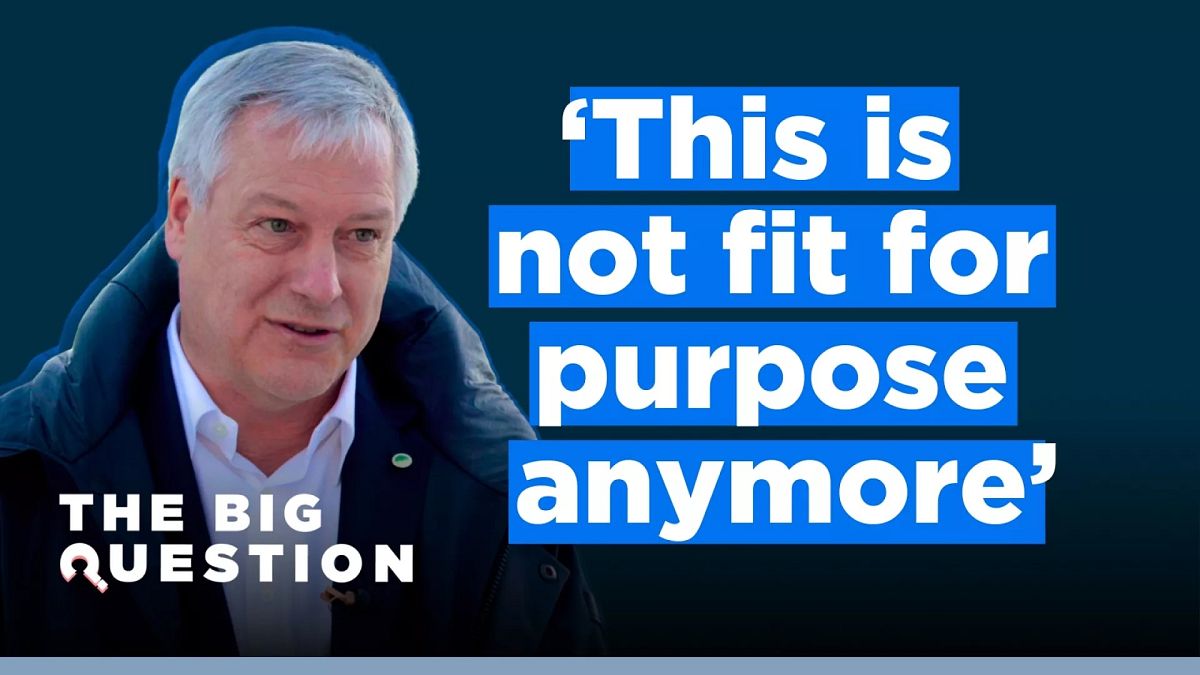The CEO of Hitachi Energy explains on the Big Question why Europe, and the rest of the world, needs to urgently invest in power grids.
Europe urgently needs to ramp up investment in its power grids to meet soaring energy demands and achieve climate goals, Hitachi Energy CEO Andreas Schierenbeck has warned.
Speaking on The Big Question with Euronews’ Angela Barnes, Schierenbeck outlined the pressing need for infrastructure expansion, emphasising that outdated regulations and slow permitting processes are hindering progress.
“We suddenly find ourselves in a situation where we need much more electrical energy than we thought,” Schierenbeck said.
“Since we got into this situation a little unprepared… now we’re struggling to fulfill the needs. We need to add more generation assets…we need to add more grid. There’s a gap.”
500 GW of renewable energy stalled due to grid limitations
One of the most striking challenges, according to Schierenbeck, is that over 500 gigawatts (GW) of renewable energy capacity in Europe is ready to connect but remains idle because the grid infrastructure is not in place. To put it in perspective, 500 GW is enough energy to power 50 billion LED light bulbs or to charge around 45 million standard EVs.
This bottleneck threatens Europe’s ability to transition to cleaner energy sources and meet the Paris Agreement targets by 2030.
Schierenbeck likened the energy shift to the rise of the internet in the 1990s, stating that governments and businesses must move faster to build the necessary infrastructure.
Regulations designed to prevent overspending holding back progress
A key obstacle, he explained, is that current regulations were designed to prevent unnecessary public spending rather than to enable rapid grid expansion. While this approach made sense in the past, it is now preventing the energy sector from adapting to urgent demand shifts.
Schierenbeck revealed that while grid expansion projects typically take seven to eight years, only two to three years are spent on construction—the remaining time is lost in lengthy permitting and approval processes.
“Regulations were built to save taxpayers money, not to over-invest,” Schierenbeck said.
“But now we need to change. The cost of not doing anything or not being fast enough is higher than the cost of investing now.”
The need for unprecedented collaboration
To overcome these hurdles, Schierenbeck called for greater collaboration between governments, businesses, and regulators. He stressed that policymakers must recognise the urgency of the situation and work alongside industry leaders to fast-track investments and remove bureaucratic obstacles.
Schierenbeck cited an example from his past experience in Germany, where a high-pressure gas pipeline initially projected to take five to seven years was ultimately built in just nine months due to regulatory flexibility.
“So you see the potential of what we have if you’re doing the right things.”
At Hitachi Energy, the company is actively working to expand production capacity, develop new grid technologies, and foster partnerships that can accelerate the transition.
Last year, it announced an investment of more than €30 million (approx. $32m) in the expansion and modernisation of its power transformer manufacturing facility in Bad Honnef, Germany. Expected to be completed in 2026, the project will generate up to 100 new jobs in the region and address the rising demand for transformers to support Europe’s clean energy transition.
This year, it also announced plans to expand and increase the workforce in its composite component factory in Piteå, Sweden.
“This investment addresses the growing demand for power transmission equipment worldwide, driven by the energy transition,” a company statement said on its website.
What Happens If Europe Fails to Act?
If Europe delays critical investments in grids and renewables, the consequences could be severe, jeopardising energy security, economic stability, and climate commitments. However, Schierenbeck remains cautiously optimistic, believing that innovation and regulatory reforms can still enable the energy transition, if the right steps are taken now.
“We will adapt, we will find solutions,” he said.
As the global energy landscape undergoes rapid transformation, Europe’s ability to modernise its power grid will determine whether it can lead the clean energy revolution, or fall behind in the race for a sustainable future.
The Big Questionis a series from Euronews Business where we sit down with industry leaders and experts to discuss some of the most important topics on today’s agenda.
Watch the video above for the full conversation with CEO of Hitachi Energy, Andreas Schierenbeck.
Video editor • Nicolas Coquet

